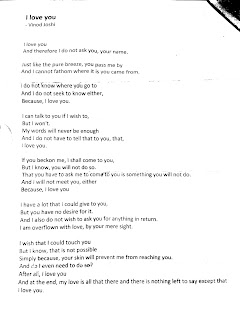Ode on Solitude
- By Alexander Pope
Alexander Pope was an English poet. He is best known for his satirical verse and use of the heroic
couplet. Pope has written this poem when he was twelve years old.
Ode on
Solitude
Happy the
man, whose wish and care
A few
paternal acres bound,
Content
to breathe his native air,
In his
own ground.
Whose
herds with milk, whose fields with bread,
Whose
flocks supply him with attire,
Whose
trees in summer yield him shade,
In winter
fire.
Blest,
who can unconcernedly find
Hours,
days, and years slide soft away,
In health
of body, peace of mind,
Quiet by
day,
Sound
sleep by night; study and ease,
Together
mixed; sweet recreation;
And
innocence, which most does please,
With
meditation.
Thus let
me live, unseen, unknown;
Thus unlamented
let me die;
Steal
from the world, and not a stone
Tell
where I lie.
‘Solitude’
is the best stage of life. mostly people connects it with loneliness but it not
about being lonely but it is about being happy in the company of our self. In
this poem Pope says that the solitude is the blessed thing of life.
The poem talks about the freedom of
responsibility to the society and social norms. Pope talks about the joy of a
person who is in his native land and not bounded or forced with the rules. The person
should not be bounded by the rules of society and to answer the society.
In second
stanza poet talks about the rights of the person and presents that how society
interferes in the life of individuals. Relatives and society play a role of a
barrier in the life of a person. A person should be free and when the person stops
thinking about what society think, he is at the stage of solitude. The person
should be free to think on his own, s/he does not need to satisfy all the
expectation of society. Poet talks about the life of those who lives in a farm,
have flocks and trees to shade them.
By the third stanza, poet found that
only those people can stay with happiness and talked about the life with good
health and peace. These people do not care about the nagging and judgements of
society. Those people do not need a lavish life for their enjoyment.
The people who are alone they do not need
to care about what others think. The person with solitude has only the fear of
his/her self only. Poet talks about his leisure life and ‘sound sleep’ with
study and ease. He says that desire for knowledge is everything but a study
without pleasure and ease is worthless. Society wants everyone to be educated
but joy should be connected with it, otherwise it is of no use.
In the final lines of poem poet wants the
life of ‘unseen’ and ‘unknown’. He wants to hide himself from the world which
gives pains and expects a lot. Thus the poem reflects the harsh reality of society
and condition of an individual.
“and not a stone
Tell
where I lie.”








